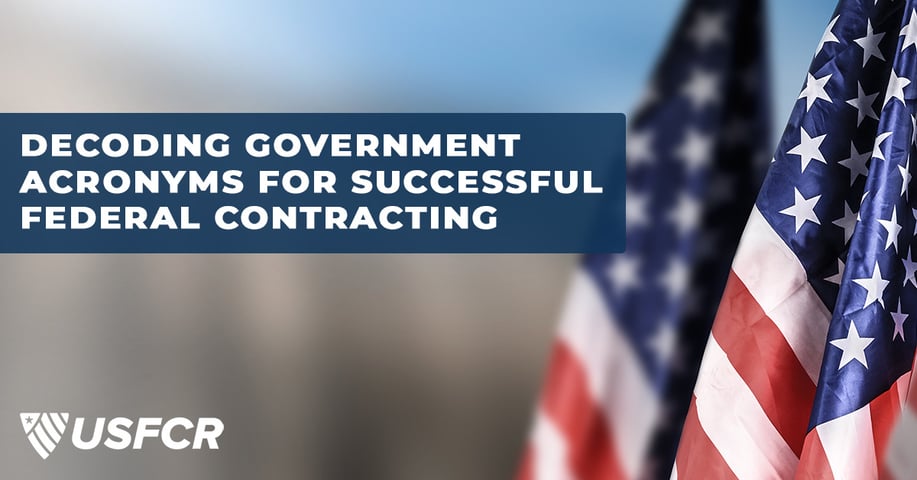
Feeling overwhelmed by the alphabet soup of government contracting? Don’t worry! This guide will break down common acronyms and abbreviations used in federal contracting and government agencies. Whether you're just starting out or looking to brush up, these terms are essential for effective communication and contract success.
Contractor Acronyms: Speak the Industry Language
Are you a contractor in the construction industry? Terms like CP (Construction Professional) and GC (General Contractor) are just the beginning. Familiarizing yourself with these abbreviations will help you navigate contracts, bids, and project management more effectively.
For example, if you’re preparing a Statement of Work (SOW) or responding to an Invitation for Bid (IFB), understanding these terms ensures you're on the same page as project stakeholders.
Key Government Acronyms You Should Know
When working with federal agencies, you'll frequently encounter acronyms like:
- DHS: Department of Homeland Security
- FEMA: Federal Emergency Management Agency
- SBA: Small Business Administration
Mastering these abbreviations is crucial for responding to solicitations, understanding compliance requirements, and navigating federal opportunities.
RFP: The Gateway to Government Contracts
The Request for Proposal (RFP) process is central to federal contracting. Here's how it works:
- Agency Solicits Proposals: Federal agencies outline project requirements.
- Contractor Submits a Bid: You detail how your business can meet the agency's needs.
- Evaluation and Award: The agency awards the contract to the best-suited proposal.
Understanding the RFP process is key to winning contracts and growing your business in the federal marketplace.
More Acronyms Every Contractor Should Learn
Here’s a quick glossary of essential terms to keep on hand:
Government Contracting Roles & Personnel Acronyms
- CO (Contracting Officer): Authorized to bind the government in a contract.
- KO (Contracting Officer - DOD Specific): Same as CO, but used by the Department of Defense.
- COR (Contracting Officer’s Representative): Oversees contract performance.
- COTR (Contracting Officer’s Technical Representative): Provides technical oversight.
- GPC (Government Purchase Card): Used by authorized personnel for small-dollar purchases.
- SSA (Source Selection Authority): Makes the final contract award decision.
- PM (Program Manager): Oversees project execution in government contracting.
Small Business & Set-Aside Program Acronyms
- SDVOSB (Service-Disabled Veteran-Owned Small Business): Set aside for veterans with service-related disabilities.
- VOSB (Veteran-Owned Small Business): Eligible for specific government contracts.
- WOSB (Women-Owned Small Business): Set-aside for women entrepreneurs.
- EDWOSB (Economically Disadvantaged Women-Owned Small Business): A subset of WOSB with additional financial eligibility criteria.
- 8(a) (8(a) Business Development Program): Helps disadvantaged businesses compete for federal contracts.
- HUBZone (Historically Underutilized Business Zone): Small businesses in distressed areas receive federal contracting advantages.
- SDB (Small Disadvantaged Business): A designation that provides access to certain federal opportunities.
Procurement & Contract Types
- BPA (Blanket Purchase Agreement): A simplified acquisition method for recurring purchases.
- IDIQ (Indefinite Delivery/Indefinite Quantity): Contract type allowing multiple task orders.
- GWAC (Government-Wide Acquisition Contract): Pre-competed contract for IT services and products.
- MAC (Multiple Award Contract): Awarded to multiple contractors for a range of services.
- FFP (Firm-Fixed Price): A contract type where the price is set and not subject to adjustments.
- CPFF (Cost Plus Fixed Fee): The contractor gets reimbursed for costs plus a fixed fee.
- T&M (Time and Materials): Payment based on labor hours and materials used.
Solicitation & Bidding Acronyms
- RFI (Request for Information): Used by agencies to gather market research.
- SSN (Sources Sought Notice): Government seeks interested contractors for potential future solicitations.
- RFP (Request for Proposal): Agencies ask for formal business proposals.
- RFQ (Request for Quotation): A simplified request for price quotes.
- IFB (Invitation for Bid): Used in sealed bidding processes.
- BAFO (Best and Final Offer): Final negotiation round in competitive bidding.
- QVL (Qualified Vendor List): Pre-approved list of vendors for future contracts.
Regulatory & Compliance Acronyms
- FAR (Federal Acquisition Regulation): Primary rules governing federal contracting.
- DFARS (Defense Federal Acquisition Regulation Supplement): Additional regulations for defense contracts.
- TINA (Truth in Negotiations Act): Requires cost data disclosure for fair pricing.
- SAM (System for Award Management): The official registration system for federal contractors.
- UEI (Unique Entity Identifier): Replaces DUNS for business identification in government databases.
- CAGE (Commercial and Government Entity Code): Identifies businesses for federal contracting.
- NAICS (North American Industry Classification System): Categorizes businesses for federal contracting.
Financial & Payment Acronyms
- WAWF (Wide Area Workflow): System for electronic invoicing and payments.
- iRAPT (Invoice, Receipt, Acceptance, and Property Transfer): Another name for WAWF.
- P-Card (Purchase Card): Used for government-approved purchases.
- GSA (General Services Administration): Oversees federal procurement contracts.
- APP (Advanced Procurement Portal): A tool used for searching federal contracts.
Tips to Stay Ahead in Government Contracting
- Keep Learning: Bookmark resources like the Federal Acquisition Regulation (FAR) for updates.
- Know Your Industry: Whether it's construction, IT, or defense, tailor your knowledge to relevant terms.
- Seek Expert Guidance: USFCR specialists can help you navigate acronyms and requirements with ease.
Ready to simplify federal contracting?
Top Articles
The 17 Most Common Types of Government Contracts Explained
Writing a Winning Capabilities Statement in 2025



